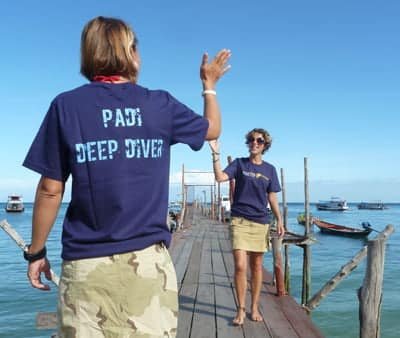Enhance Your Divemaster Skills: Why PADI Specialties Matter
So, you’re on your way to becoming a PADI Divemaster, or perhaps you’re already certified. That’s a fantastic achievement! But have you considered how specialty courses can significantly boost your skills, employability, and overall experience as a dive professional? Completing relevant PADI specialties during or after your Divemaster course isn’t just about collecting more certification cards; it’s about becoming a more versatile, knowledgeable, and valuable Divemaster.
Why Should a Divemaster Consider PADI Specialties?
Think about your future as a dive professional.
Will you guide divers on enriched air Nitrox? Almost certainly, especially if you dream of working on liveaboards where Nitrox is common.
Are you interested in technical (Tec) diving or gas blending? These advanced skills open up new diving adventures and career paths.
Do you plan on leading deeper dives? To guide divers confidently to depths like 30-35 meters, a Deep Diver certification is essential.
These are just a few reasons why certain specialties are highly recommended. In fact, courses like Deep Diver and Search and Recovery are so crucial they’ve become integrated parts of many modern Divemaster programs.
Key PADI Specialties to Elevate Your Divemaster Career
Based on my experience, here are some PADI specialty courses that I strongly recommend any aspiring or current Divemaster consider:
Essential Certifications for Every Divemaster
Deep Diver: As mentioned, this is crucial for guiding dives beyond the standard open water limits.
Enriched Air Nitrox Diver: A must-have for guiding divers who want longer bottom times and for working in many dive operations, especially liveaboards.
Search and Recovery Diver: Enhances your problem-solving skills and ability to manage underwater situations, vital for a Divemaster.
Wreck Diving Specialty: Exploring Underwater History
One fantastic specialty to consider, especially if you’re diving in an area with great wrecks, is the Wreck Diver course. For example, at Master Divers, the HTMS Sattakut offers an ideal site for learning penetration techniques, alongside other popular wrecks like the MV Trident. Completing this can be a stepping stone, especially if you combine it with Tec courses, potentially leading to exciting opportunities like Tec liveaboards.
Stepping into Tec Diving: A New Realm
Many dive centers with strong technical diving departments, like Master Divers, offer great exposure to the Tec world. I even had the chance to try a Discover Tec dive for free during my Divemaster course. This introductory experience allows you to get into the gear and practice some basic skills in a shallow, controlled environment (we spent about 90 minutes at 10 meters). It’s a fantastic way to see if Tec diving is for you and to understand the benefits of diving with twinsets. With experienced instructors, the complexities of Tec diving become much easier to grasp.
Gas Blender: Mastering the Mix
To become an even more well-rounded Divemaster, I decided to complete my Tec Gas Blender course shortly after my Divemaster certification. This qualification allows me to blend Nitrox and become proficient with compressor operations – a very useful skill for any dive operation.
Equipment Specialist: Know Your Gear Inside Out
I’ve always been curious about how dive gear works and how to maintain it. The team I trained with encouraged me to take an Equipment Specialist course. After getting certified, and under careful supervision, I was able to help maintain and manage the dive shop’s equipment. This is an incredibly valuable asset for a Divemaster. Now, I’m the one answering questions ranging from “How do I change my mouthpiece?” to “There are bubbles coming out of…”.
Underwater Photography: Capturing the Marine World
One of my biggest passions is capturing the beauty of our underwater planet and contributing to its documentation. With marine ecosystems facing numerous threats, the images we take now might be some of the last records of certain species. This desire to educate people about these fragile environments, combined with my love for showing others the wonders of the sea, made Underwater Photography another essential skill for me.
Learning from experienced underwater photographers can make a huge difference. For instance, Ayesha, a published photographer at Master Divers, coached me through the PADI Digital Underwater Photographer (DUP) specialty. She then introduced me to her personalized course, focusing on individual skills and needs, which helped me get to grips with it all quickly. Her encouragement was also key, and soon I felt confident enough to complete the PADI DUP Instructor course.
Launching Your Divemaster Career with Added Specialties
Now, as I embark on my Divemaster career, I’m not only using all the skills from my core training but also leveraging my specializations. The dive center I’m with is actively encouraging me to build my profile as an Underwater Photographer and Photography Instructor. This provides a fantastic opportunity for fun, informal teaching, even as a Divemaster.
